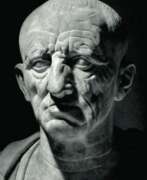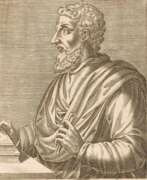Historians 2nd century BC


Marcus Porcius Cato the Elder, also known as Cato the Censor (Censorius), was an ancient Roman soldier, politician, historian, and writer.
Originally from a plebeian family, Cato, driven by ambition, achieved high office and held various public positions. He was also a famous orator, engaged in the improvement of Rome. Cato was an active campaigner against vice and luxury, for which he earned the nickname Censor. He was also an innovator of Roman literature, a historian, the first significant Latin prose writer, and the first author of a history of Italy in Latin.


Marcus Terentius Varrō, sometimes called Varro of Reatinus, was an ancient Roman scholar-encyclopedist and writer.
Varro was a very prolific writer: the titles of his 74 works are known, totaling 620 books. Varron was engaged in logic, language, poetry, history, law and geography, history, art, history of literature, theory of music. Judging by the surviving accounts of his contemporaries, the most significant of Varron's lost works were "Divine and Human Antiquities" (Antiquitates rerum humanarum et divinarum) in 41 books and "Portraits" (Imagines) in 15 books, which contained biographies of famous Greeks and Romans, as well as 700 portraits that illustrated the text. The treatise "On Agriculture" (De re rustica) in three books has survived in complete preservation.